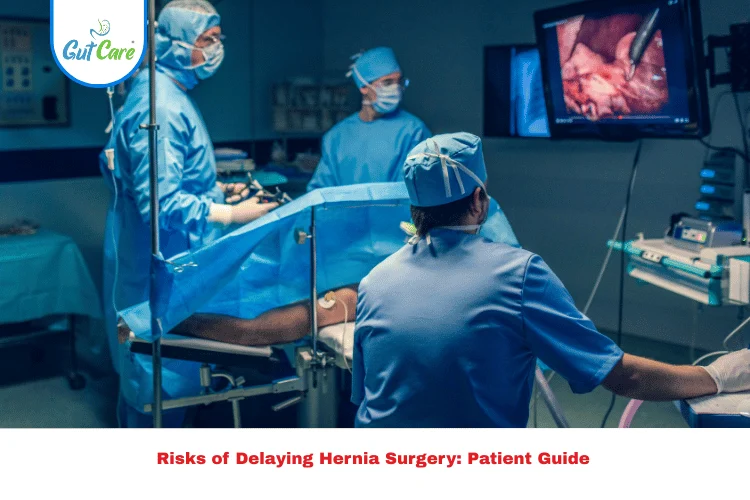Inguinal hernia complications can become serious if left untreated. An inguinal hernia occurs when tissue, such as part of the intestine, protrudes through a weak spot in the abdominal muscles. At Gutcare Clinics in Bangalore, Dr. Yuvrajsingh Gehlot, an experienced colorectal surgeon, emphasizes early detection and timely management to prevent severe outcomes. Understanding the risks, symptoms, and treatment options for inguinal hernias especially in adults, infants, and newborns is essential for maintaining health and avoiding emergency situations.
What Is an Inguinal Hernia?
An inguinal hernia, also called hernia inguinal, is a common condition where the intestine or fatty tissue pushes through the abdominal wall in the groin area. It is more common in men but can also affect women and children. Newborns and infants may experience congenital inguinal hernias, often detected by swelling in the groin or scrotum.
Key points:
- Can be direct or indirect (indirect inguinal hernia symptoms include a bulge near the groin that may appear during crying or straining).
- Can be present at birth (inguinal hernia newborn) or develop later in life.
- Symptoms often worsen with coughing, bending, or lifting heavy objects.
Common Severe Inguinal Hernia Complications
Even though many hernias are initially painless, ignoring them can lead to serious complications:
1. Incarceration
This occurs when hernia tissue becomes trapped and cannot be pushed back into the abdomen. Incarceration can lead to bowel obstruction and severe discomfort. Infants and newborns are particularly vulnerable to this condition.
2. Strangulation
Strangulated hernia is a medical emergency. Blood flow to the trapped tissue is cut off, causing tissue death. Signs include sudden, severe pain, redness, nausea, and vomiting. Immediate surgery is often required to prevent life-threatening complications.
3. Bowel Obstruction
An inguinal hernia can block the intestines, causing vomiting, constipation, abdominal swelling, and pain. Untreated obstruction can result in severe illness or sepsis.
4. Recurrence and Enlargement
Hernias left untreated can grow larger over time, increasing the risk of complications. Proper surgical management can prevent recurrence and improve quality of life.
5. Infection
Strangulated hernias can lead to infection in the surrounding tissues. Severe infections may require prolonged hospitalization and intravenous antibiotics.
Risk Factors That Worsen Inguinal Hernia Complications
An inguinal hernia occurs when tissue, such as part of the intestine, protrudes through a weak spot in the lower abdominal muscles. While some hernias are minor and manageable, certain risk factors can worsen inguinal hernia complications, leading to severe pain, incarceration, or even strangulation of the bowel. Recognizing these risk factors early helps in timely intervention and avoiding life-threatening conditions.
- Risk Factors That Increase Inguinal Hernia Complications
- How Certain Factors Can Worsen Inguinal Hernia Outcomes
- Understanding Risk Factors for Severe Inguinal Hernia Complications
- Inguinal Hernia Complications: Key Risk Factors to Watch
- Factors That Make Inguinal Hernia More Dangerous
Prevention and Management
While some hernias require surgery, early detection and lifestyle measures can reduce complications:
- Hernia exercises (mild core strengthening) recommended by a doctor
- Avoid lifting heavy weights or straining
- Maintain a healthy weight
- Timely medical consultation if swelling or discomfort appears
Surgical options, such as laparoscopic or open hernia repair, are recommended by Dr. Yuvrajsingh Gehlot for severe or high-risk cases. Early intervention ensures minimal recovery time and reduces the risk of complications.
When to See a Doctor
Immediate medical attention is required if you notice:
- Severe groin pain or swelling
- Redness or discoloration of the bulge
- Nausea, vomiting, or fever
At Gutcare Clinics Bangalore, Dr. Yuvrajsingh Gehlot offers specialized care for all age groups, from infants to adults, with advanced surgical techniques and personalized follow-up plans.
Conclusion
Inguinal hernia complications can escalate quickly if ignored. From incarceration and strangulation to bowel obstruction and infection, the risks are significant. Early diagnosis, proper management, and lifestyle precautions can prevent severe outcomes. Consulting an experienced colorectal surgeon ensures safe treatment and long-term relief. Gutcare Clinics provides expert evaluation, modern surgical options, and preventive guidance to protect your health and avoid emergency situations.
FAQs
1.What are common inguinal hernia complications?
Inguinal hernia complications include incarceration, strangulation, bowel obstruction, infection, and hernia recurrence.
2.Can infants get severe inguinal hernia complications?
Yes, inguinal hernia infant cases can rapidly develop incarceration or strangulation, requiring prompt medical attention.
3.How can I avoid inguinal hernia complications?
Avoid heavy lifting, maintain healthy weight, follow mild core exercises, and consult a doctor at the first sign of a bulge.
4.What are indirect inguinal hernia symptoms?
Indirect hernias may appear as a groin bulge during straining or crying in infants. Pain or swelling indicates possible complications.
5.How does Gutcare Clinics manage inguinal hernia complications?
At Gutcare Clinics Bangalore, Dr. Yuvrajsingh Gehlot provides timely evaluation, safe surgical repair, and follow-up care to prevent complications and ensure recovery.




